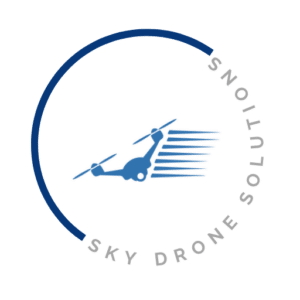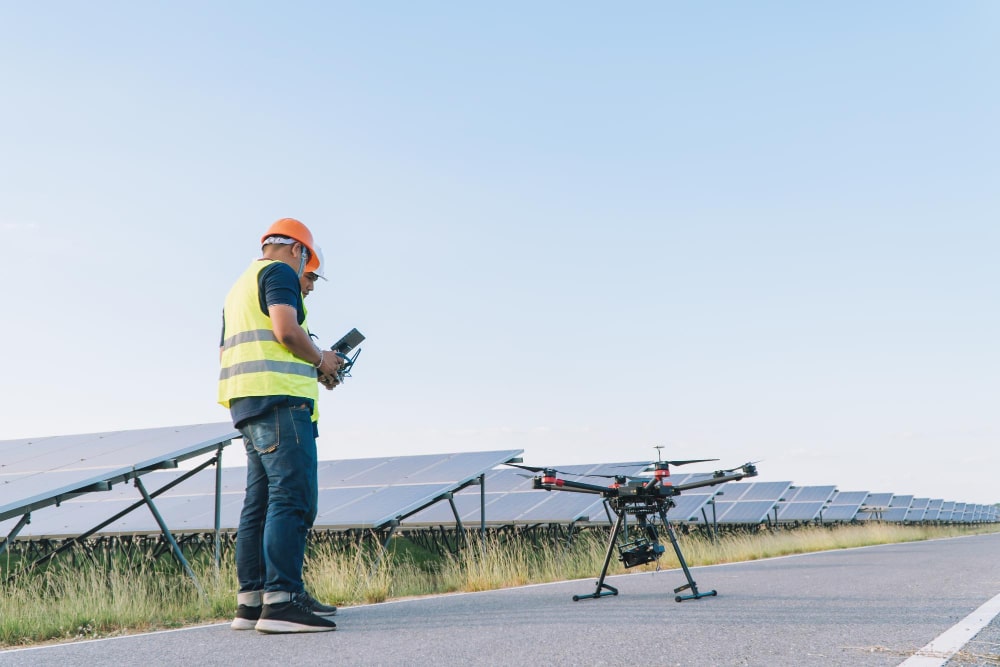Understanding Thermography for Accurate Drone Inspection
Thermography plays a crucial role in the accuracy of solar panel drone inspections. It uses infrared technology to detect temperature variations across the panels, allowing drones with advanced cameras and sensors to capture high-resolution images and conduct thorough inspections.
Aerial thermal imaging technology can identify potential issues, such as micro-cracks or faulty connections, which might not be visible to the naked eye. This scientific method ensures that each panel is inspected with precision, providing accurate data to enhance the efficiency of your solar system. The thermography process in drone inspections offers several advantages over traditional methods, including faster detection times and improved safety by eliminating the need for physical presence on rooftops.
With infrared imagery, drones can pinpoint problem areas, enabling timely maintenance and reducing energy losses. By leveraging this technology, Sky Drone Solutions ensures that the accuracy of solar inspections is maximized, ultimately translating to longer operational life for your solar panels and a higher return on investment.
How Accurate Are Drones in Solar Panel Inspections?
Drones have revolutionized how we ensure the accuracy and reliability of solar panel inspections. At Sky Drone Solutions, we emphasize that drones offer a highly reliable method for inspecting solar installations. The precision of drone inspections is unmatched, often uncovering anomalies that are not visible through traditional means.
By harnessing state-of-the-art technology, drones provide highly accurate data for solar panel inspections. They allow for comprehensive analysis by capturing detailed imagery and data, crucial for identifying issues and ensuring optimal performance. The high accuracy and reliability of drone inspections make them ideal for maintaining solar panel efficiency.
Because drones decrease the chances of human error, their precision is invaluable, especially when inspecting expansive solar farms. In summary, utilizing drones in solar inspections is not just about improved accuracy; it’s about achieving higher reliability in results, leading to enhanced solar panel performance and longevity.
Invest in drone solar inspections to ensure your solar system remains in top condition.
Factors That Impact Drone Inspection Accuracy
Drone inspection accuracy is influenced by several factors that determine the reliability of results. Understanding these variables can help ensure optimal performance during inspections:
Weather Conditions
Strong winds, rain, or extreme temperatures can disrupt drone stability, affecting image clarity and data accuracy.
Camera Quality
High-resolution cameras and thermal imaging sensors are essential for detecting minor issues on solar panels with precision.
Operator Expertise
Skilled operators understand how to navigate drones effectively, adjust settings, and interpret data correctly, ensuring accurate inspections.
Software Capabilities
Advanced analytics and AI-driven software improve data interpretation, reducing false positives and enhancing inspection precision.
Investment in High-Quality Drone Equipment
Investing in high-quality drone equipment is essential for enhancing the accuracy and efficiency of solar panel inspections. Reliability and multi-functionality are paramount when selecting drones for these inspections.
High-quality drone technology ensures that the equipment can handle the intricate demands of solar farms, delivering precise data and reducing the likelihood of errors. By choosing advanced drone equipment, companies can ensure their inspection processes are more reliable, providing accurate real-time data on the condition of solar panels.
Moreover, high-quality drones often come with excellent manufacturer support, ensuring that any technical issues can be resolved swiftly. This investment not only improves inspection accuracy but also boosts the overall efficiency of the process.
Companies can significantly reduce the time and costs associated with manual inspections. By utilizing top-tier drones, businesses can maintain the performance and longevity of their solar installations. Investing in high-quality drone equipment enhances inspection capabilities, making these tools indispensable for maintaining optimal solar panel health.
Benefits of Trusting a Qualified Professional for Inspections
Hiring a qualified professional for drone inspections ensures reliable, efficient, and safe results. Here’s why it’s worth investing in expert services:
Accurate Results
- Professionals use high-quality equipment and advanced techniques to accurately identify even the most minor defects.
Enhanced Safety
- Certified operators are trained to perform inspections in challenging environments without risking safety.
Time Efficiency
- Professionals complete inspections faster, minimizing downtime and enabling quicker decision-making.
Cost Savings
- Preventive maintenance identified through precise inspections helps avoid costly repairs and extends the lifespan of solar panels.
Regulatory Compliance
- Experts are well-versed in industry standards and regulations, ensuring that inspections meet legal and operational requirements.
Trusting a professional ensures that inspections are accurate and conducted to the highest standards, ultimately safeguarding your solar energy investment.
Traditional vs. Drone Solar Inspection Methods Compared
Precision is crucial, with drone inspections demonstrating superior accuracy in identifying faults compared to traditional manual inspection techniques. Drones with high-resolution cameras can detect even the slightest discrepancies on solar panels, ensuring that every inch is thoroughly examined.
Efficiency is yet another area where drone methods outperform traditional methods. Unlike conventional methods, which can be labor-intensive and time-consuming, drones can cover vast areas expediently, ultimately saving time and resources. Drone inspections also significantly enhance safety.
Manual inspections often require workers to climb onto roofs or utilize lifts, posing risks. Drone methods mitigate these safety concerns by enabling ground-based operation, eliminating the need for hazardous manual tasks. Sky Drone Solutions leverages these drone inspection advancements to offer more reliable and precise solar inspections, demonstrating an industry shift towards embracing modern technology while acknowledging the limitations of traditional methodologies.
Time and Cost Savings with Drone Inspections
Drone inspections are rapidly transforming the efficiency of solar farm maintenance, providing substantial time and cost savings. By utilizing drones for solar inspections, Sky Drone Solutions offers an innovative approach that supports solar farm operators in streamlining their inspection and maintenance processes.
Traditional inspection methods are often time-consuming and costly, requiring significant human resources and resources. On the other hand, drone inspections dramatically reduce the time required for inspecting solar panels, allowing technicians to maintain optimal solar farm efficiency. This leads to noteworthy cost savings, as drones can quickly identify potential maintenance issues without requiring extensive manual inspections.
As we’ve discussed, investing in drone technology boosts inspection accuracy and provides considerable financial benefits. At Sky Drone Solutions, we support operators in maximizing their inspection procedures, fostering efficiency and savings.
With drone inspections’ precision, maintenance teams can prioritize and address issues effectively, ensuring the solar farm performs at peak efficiency. Thus, drone inspections reinforce the importance of integrating them into regular solar farm operations.
Evaluating Return on Investment for PV Inspection Drones
Using drones for solar panel inspections can save significant costs through reduced labor and time investments. Unlike traditional manual inspections, drone flights can cover extensive areas quickly, enhancing efficiency in identifying faults and inefficiencies in solar PV systems.
The initial investment in drones may seem steep, but the ongoing savings in labor costs and improved system performance offset the outlay over time. Companies investing in drone technology can benefit from increased ROI through fewer system outages, more consistent energy production, and detailed inspection data that help make informed maintenance decisions.
Employing drones in solar inspections enhances the frequency and detail of audits. It provides a comprehensive view of system health. With a focus on long-term benefits, integrating drones into the inspection process represents a sound investment for maximizing solar PV system performance.
Drone Inspection: A Comprehensive Overview of Solar Inspections
Drones have significantly enhanced the accuracy of solar panel inspections, providing a comprehensive overview of solar PV systems. Companies managing solar farms now rely heavily on drone inspection technology for accuracy and efficiency. By conducting detailed aerial surveys, these drones collect valuable data, offering an unmatched level of insight into the condition of solar panels.
Whether it’s a utility-scale solar farm or a minor PV installation, drones can identify issues that could compromise system performance. They can perform inspections quickly and safely, providing a detailed overview of solar panels and allowing for precise maintenance and repair planning.
This technological advancement has facilitated improved solar inspections, reducing the time and cost associated with traditional methods. By leveraging drone technology, companies can better understand their solar systems’ operational status, ensuring maximum efficiency. Consequently, investing in drone inspections proves beneficial for maintaining the integrity of solar farms, leading to improved energy production and sustainability.
Importance of Skilled Drone Pilot for Solar Panels
The importance of having a skilled drone pilot cannot be overstated regarding solar panel inspections. Solar panels need regular commissioning and maintenance, where drones play a crucial role. A qualified pilot ensures the drone captures accurate data, minimizing the risk of errors.
Drone pilots are trained to efficiently navigate the solar panel layout, maximizing safety and precision. The significance of commissioning skilled drone pilots is not just about expertise but also about ensuring the long-term health of solar infrastructure. Pilots are adept at identifying potential issues early, enabling timely maintenance interventions, thus avoiding costly repairs later.
Skillful drone handling ensures thorough and noninvasive inspections. For businesses and homeowners alike, the ability to contact a seasoned drone pilot can be the difference between successful solar panel management and unforeseen complications. Therefore, the importance of a skilled pilot in drone inspections for solar panels extends beyond mere operation to becoming a strategic partner in solar asset management.
Advantages of Drone Inspections for Maintenance and Interpreting Data Accuracy from Inspections
Sky Drone Solutions provides significant advantages for solar panel maintenance through drone inspections. These inspections allow quicker detection of issues like dirt or damage, offering crucial data without manual evaluations.
The challenges associated with manual inspections, such as time and potential inaccuracy, are significantly reduced, and the involvement of experienced drone pilots ensures high precision levels. Thanks to specialized software, which helps analyze patterns and spot anomalies, interpreting the data collected via solar panel drone inspections becomes efficient.
Thus, the drone inspection process is streamlined, reducing maintenance labor and costs while enhancing data interpretation accuracy. As solar panels are increasingly adopted, drone solutions become invaluable, guaranteeing efficient, uninterrupted operation.
Furthermore, panel drone inspections’ accuracy yields better maintenance outcomes, contributing to enhanced energy production. Deploying drones for solar panel inspections ensures regular scanning, catching early signs of problems before they escalate and highlighting the necessity of skilled pilots and software in ensuring optimal data interpretation.

